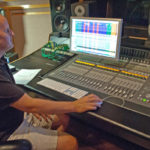Article from the “Falls Church City Newpress:
For anyone who has ever wanted to learn to record music, or just want to know how recordings are made, Cue Recording Studios in downtown Falls Church has a school that offers classes in professional audio engineering.
Cue Recording Studios opened 35 years ago and has been at its current Falls Church location for 30 years. During this time, they’ve worked with artist projects and personalities ranging from Michael Jackson to Sheryl Crow. They began offering classes 10 years ago as the Cue Studios Center for Audio Engineering.
“We get a lot of interns here from other schools around the country, and a lot of them don’t really have the skills that we would like them to have. So what I noticed about 10 years ago was this need,” said Cue Studios President Jeff Jeffrey. “Having an opportunity to let students benefit from our years of experience here and all our equipment, and for us to give them a head start in trying to get a job in a lot of the markets around here, locally and nationally, it seemed like a neat thing to do for the community as well as for us as a business.”
The instructors place an emphasis on hands-on learning, which students in larger programs often do not receive.
“We get people coming in and saying, ‘Well, I’m going to college for audio engineering, and they won’t let us touch anything until my junior year.’ That’s crazy because you’re not going to learn,” “Here, you’re driving the car the first day.”
Both one-person classes and small group classes are offered, with an emphasis on one-on-one learning.
“With the one-on-one courses, we can really cater to that person. If they come in and say ‘I really want to learn to work with artists,’ or ‘I’d really like to mix,’ we can tailor the course to what they want.
Although they focus on hands-on learning, students still receive the required basic technical background and most of the courses use a textbook.
For those who are looking for a career, the audio industry is rapidly expanding and in demand. Although recording music may be the first thing that comes to mind, there is a diverse range of uses for Pro Audio, the audio software Cue Recording Studios and many others use, including music for video games, narration recordings, and audio post-production for film and television.
“There’s a big market for this kind of thing,” said Jeffrey. “It’s growing all the time with all the new media companies, all the cable programming, and with all the downloadable songs. It’s bigger than it ever has been.”
The Center for Audio Engineering can teach the skills required for all fields of audio production.
“We get all kinds of students. One wants to be a music producer, one wants to be an audio engineer at Discovery Channel and record dolphins making noises, you know? And whatever it is that you want to learn, because we’ve been doing it our entire lives, we can teach you how to do it,” said Jeffrey.
Even with all the offered classes, Cue Recording Studios remains a fully functioning recording studio. It has 11 gold and platinum awards and is a member of the National Academy of Recording Arts and Sciences (NARAS) and the Society of Professional Audio Recording Services (SPARS). Students have the opportunity to work with artists using the studios as they take their classes and watch other professionals at work.
Our experts create a strong support system for students. We encourage all of our students to come up and spend time either interning or coming through and talking to the different staffers here and asking the questions that they may not have had the opportunity to ask in class,” said Jeffrey.
The Cue staff is happy to talk to anyone interested in attending the Center for Audio Engineering.
“We encourage all of our potential students to come in and have a free meeting with Ken Schubert, our chief instructor.
More information about the Cue Studios Center for Audio Engineering can be found on its website, centerforaudioengineering.com, or by calling the office at 703-532-9033. The studios are located at 109 Park Ave., Falls Church.



